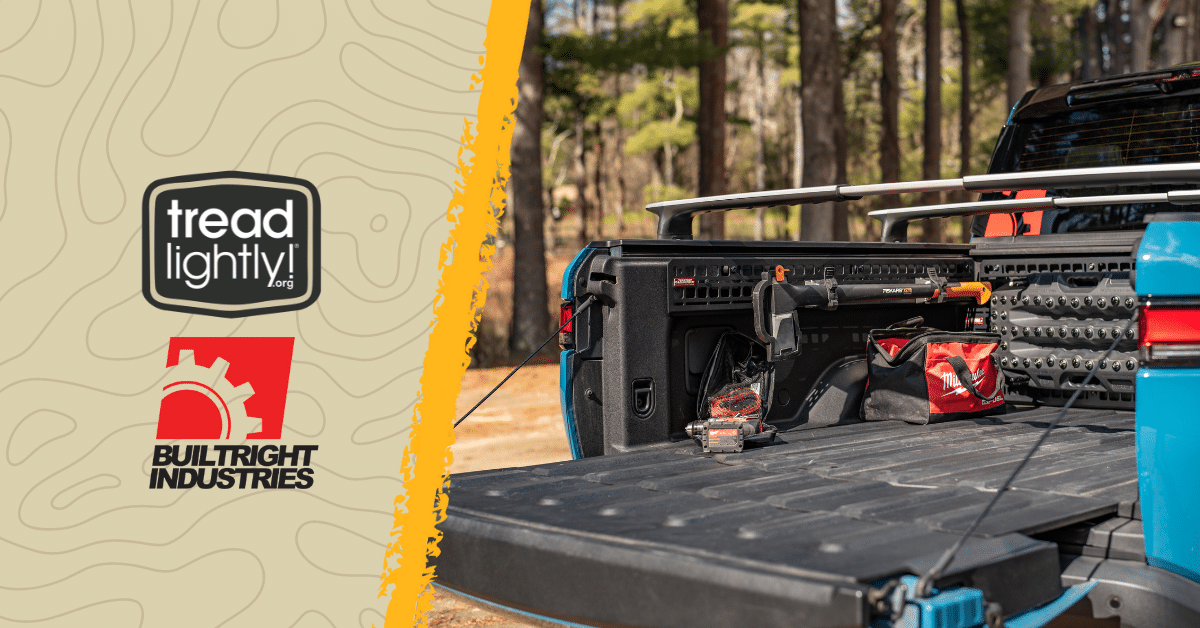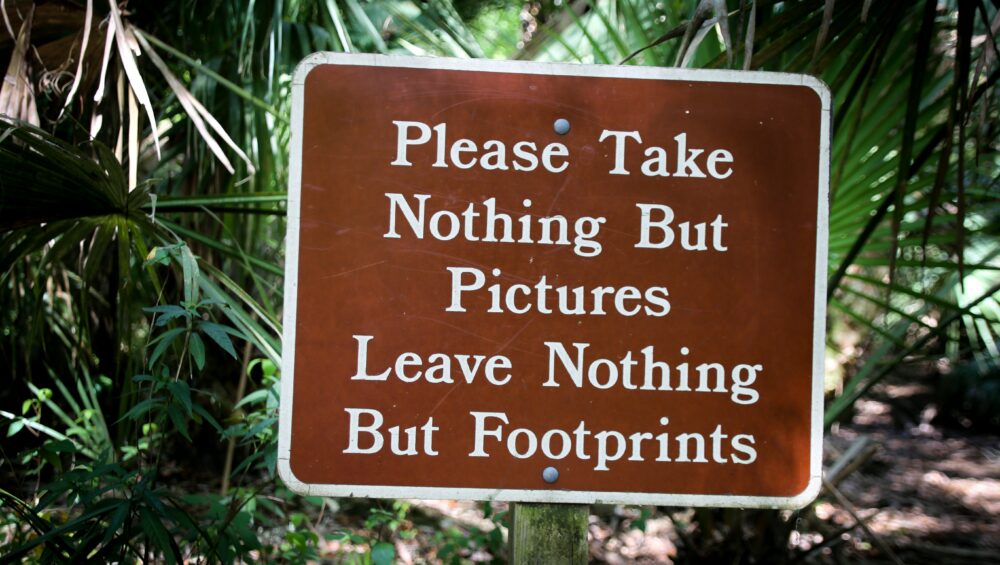

Estimated Ship Date
There is something special about rolling off the pavement and into the wild. The noise of the everyday world fades into the background. For lovers of the outdoors, off-road trails are a chance to explore, challenge ourselves, and connect with nature in a way that few other hobbies can match.
But the privilege of driving off-road comes with responsibility. Every rut we cut, every campsite we set up, every stream we cross leaves an impact. The trails we enjoy today are only open because the people before us respected the land and each other. If we want to hand down the same opportunities to the next generation, we need to be mindful of how we wheel.
That is where Tread Lightly! comes in. Since 1990, the organization has been dedicated to promoting responsible outdoor recreation through education, stewardship, and simple, practical guidelines. Their five principles are not about limiting fun, but about making sure that fun is sustainable.

The first principle of Tread Lightly is simple: Travel Responsibly. That means staying on designated trails, avoiding areas marked as closed, and resisting the temptation to cut switchbacks, ride fields, or make your own path.
Imagine this: you are crawling up a narrow trail carved into the side of a mountain. Ahead, a tight switchback turns sharply. It is tempting to cut across the inside corner, especially when your rig has the ground clearance to handle it. But when you do that, you widen the trail and start erosion that can eventually destabilize the hillside. Multiply that by hundreds of vehicles over a season, and suddenly the switchback is unsafe and in need of repair, or worse, the trail is shut down permanently.
The same goes for mudholes. Many drivers swing wide into the grass or brush to avoid a sloppy mess, but every time someone does, the trail gets wider. Before long, the once narrow path has become a scar across the landscape. Traveling responsibly means making the choice to stay on the trail, even if it means getting dirty or turning back.
And let’s not forget speed. The trail is not a racetrack. By respecting posted speed limits and slowing down when you pass campsites, hikers, or horseback riders, you protect the surface of the trail and show courtesy to others. Dust, noise, and flying gravel affect more than your own experience, they impact everyone else who shares the space.
Off-road trails are shared spaces. You might meet mountain bikers, hikers, horseback riders, or other drivers along the way. The second Tread Lightly principle, Respect the Rights of Others, reminds us that courtesy goes a long way.
For example, when two vehicles meet on a steep incline, the uphill driver typically has the right of way. That is because it is harder for them to regain momentum if they stop. But etiquette goes beyond rules of the road. If you are in a heavily modified Jeep and you come across a family in a stock crossover trying to make it through a rocky section, patience and respect mean offering guidance, spotting, or simply giving them space to figure it out.
Noise control is another big part of this principle. A roaring exhaust might sound cool to you, but it can ruin the quiet solitude that others came to enjoy. Even fellow off-roaders appreciate when drivers keep noise to reasonable levels. The outdoors offers peace and escape, and we owe it to others to keep it that way.
Heading into the backcountry without preparation is not just risky for you, it can harm the environment and inconvenience others. Tread Lightly’s third principle, Educate Yourself, is about knowing the rules, understanding your vehicle, and being prepared for the conditions.
Let’s say you want to hit a trail in the desert southwest. Do you know if that trail has seasonal closures to protect wildlife? Do you have a permit if it runs through Bureau of Land Management (BLM) land? These details matter. Ignoring them is not just a fine waiting to happen, it is a step toward land managers deciding to shut access altogether.
Educating yourself also means knowing your own rig. Do you know your ground clearance, your approach and departure angles, and how to properly air down for sand or rocks? A driver who takes the time to understand their equipment is less likely to get stuck in the middle of the trail, blocking others.
Preparedness is another piece. A truck loaded with recovery gear, fluids, and basic tools is far better equipped than one that rolls in with nothing but optimism. BuiltRight Industries has always believed in giving drivers the organization and mounting solutions to carry what they need. From MOLLE panels that hold recovery straps and shovels to seatback organizers for maps and radios, having your gear secure and accessible is part of responsible trail etiquette.

Some places simply cannot handle off-road traffic. Avoid Sensitive Areas, the fourth Tread Lightly principle, is all about keeping our tires off land that needs to stay undisturbed.
Think about alpine meadows in the Rockies. One pass through with a set of mud terrains can leave ruts that take decades to heal. Wetlands, tundra, archaeological sites, and even cultural landmarks are off-limits for a reason. Once damaged, they may never return to their natural state.
Seasonal closures also exist for wildlife. In some areas, trails shut down during breeding or migration periods. It might feel frustrating to see a locked gate when you drove hours to reach the trailhead, but respecting those closures is critical to preserving biodiversity.
And sometimes the decision is personal. If you approach a section of trail that looks unstable or likely to cause erosion, the responsible choice is to turn around. It can sting to walk away from a challenge, but trail etiquette means putting the health of the land ahead of your ego.
The last principle, Do Your Part, is about stewardship. Responsible off-roaders are not just users of the land, they are caretakers of it.
That starts with the basics: packing out everything you bring in. Food wrappers, water bottles, and gear packaging do not belong in the woods. But good stewardship often means going further. If you see trash, pick it up. If you encounter a blocked drainage ditch or fallen branch, clear it if you can do so safely.
Off-road clubs around the country organize cleanups and trail maintenance days under the Tread Lightly banner. These events not only restore damaged areas, they also show land managers that the off-road community is invested in preserving access. Every bag of trash collected is a visible reminder that off-roaders care.
And it is not just about the land. Doing your part also means being a good representative of the community. Wave to fellow trail users, thank volunteers and rangers, and set the example for newcomers. Culture is contagious, and when we model respect, others follow.
Trail etiquette changes with the seasons, but the principles stay the same.
Winter: Snow trails require special caution. Stay on designated routes, avoid spinning tires that dig into the snowpack, and never drive across closed snowmobile tracks. Carry recovery boards, tow straps, and a shovel. Always tell someone where you are going.
Spring: Melting snow and rain make trails muddy and vulnerable. Traveling responsibly here means knowing when to turn back to avoid tearing up saturated soil. Mud can be fun, but creating deep ruts damages trails for months.
Summer: Dry conditions bring dust. Slow down near campsites and trailheads to minimize your impact. Fire danger is also high, so be cautious with campfires and vehicle heat around dry brush.
Fall: Hunting seasons bring more shared use of public land. Respect others by wearing bright colors outside your vehicle and yielding to hunters on foot or horseback. Trails can also get slick with leaves, so drive with care.
Every season presents unique challenges, but sticking to Tread Lightly’s principles makes sure the fun does not come at the expense of the land.
Trail etiquette is not about memorizing a rulebook, it is about adopting a mindset of respect and responsibility. The Tread Lightly principles are easy to remember, but what matters is putting them into practice every time you head out.
BuiltRight Industries is proud to be a partner of Tread Lightly. We share the same vision: outdoor recreation that is respectful, responsible, and sustainable. Our products are designed to help off-roaders stay prepared and organized, from MOLLE panels that secure recovery gear to storage systems that keep tools accessible. Being ready for the trail is not just about performance, it is about stewardship.
By equipping your rig with the right gear and following Tread Lightly’s principles, you are not only protecting yourself and your truck. You are helping preserve access for everyone who loves to get off the pavement.

Every time we drive off the pavement, we make a choice about how the world sees off-roaders. We can be the ones who tear up land and leave trash behind, or we can be the ones who protect access and build respect.
By following Tread Lightly’s principles, we ensure that our favorite trails remain open, healthy, and ready for the next generation of explorers. Because at the end of the day, off-road adventures are not just about where we go. They are about how we treat the land that lets us get there.
For more about the Tread Lightly organization, their mission, and how you can get involved, visit treadlightly.org.
BuiltRight at the Sand Sports Super Show September 19th-21st!
Winter Vehicle Prep: Maintenance and Must-Have Gear for Cold Weather Driving